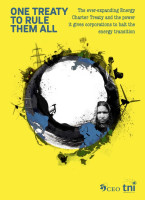The Energy Charter Treaty is an anti-climate agreement. Sign the petition
To tackle the climate crisis we need to keep fossil fuels in the ground. But governments that phase out coal, end gas production, or stop oil pipelines can be sued by corporations in private courts and be held liable for billions in damages. How? Under the Energy Charter Treaty (ECT). It is now up to European governments and the European Commission to pull out of the anti-climate ECT and stop its expansion to even more countries. Take action today to make this happen!

"To European governments, parliaments and EU institutions:
Pull out of the Energy Charter Treaty and stop its expansion to other countries! The treaty allows coal, oil and gas corporations to obstruct the transition to a clean energy system. Disarm fossil fuel firms now, so they can no longer impede urgent climate action!"
Sign and demand the EU and EU governments withdraw from the ECT. The climate emergency won’t wait.
This petition is supported by a wide coalition of organisations, including Avaaz, Campact, Climate Action Network (CAN) Europe, Corporate Europe Observatory, Transnational Institute, WeMove and many others.
The treaty Europe must leave to fight climate change
When the Energy Charter Treaty (ECT) was signed in 1994, few could have predicted the vast costs it would bring to its signatories or the ways it would prevent action on the climate crisis.
The EU and EU governments now have an opportunity to stop this aberration by collectively withdrawing from it. This petition demanding that governments withdraw from the ECT is rapidly gaining wide support. A new round of negotiations to ‘modernise’ this outdated and dangerous treaty is due to resume on March 2, but the negotiations are doomed to fail -- none of the signatories have demonstrated real ambition to defang the ECT’s most dangerous provisions.
Meanwhile, Investigate Europe has revealed new details about the great threat the ECT poses to the climate, including the staggering scale of the fossil fuel infrastructure protected by the treaty in the EU, UK and Switzerland (some 344.6 billion euros); the close ties between the senior staff of the ECT secretariat and the fossil fuel industry, and new findings about the treaty’s opaque arbitration processes.
What is the Energy Charter Treaty (ECT) and why does it matter?
The ECT is an agreement that applies to more than 50 countries. It gives foreign investors in the energy sector broad powers to sue states over government actions that have supposedly damaged their investments. That includes climate policies – for example German coal giant RWE is suing the Netherlands for €1.4 billion in 'compensation' for the Dutch coal phase-out. Investors can use a shadow court system to force governments to pay billions in compensation. The ECT acts as a brake on attempts to transition to renewable energy because its legal regime favours investors and because governments can be hit with catastrophically large fines.
Why does this matter now? Modernisation, expansion and the necessity of withdrawal
The signatories will meet in early March to discuss possible treaty reform and 'modernisation'. These discussions are doomed to fail though, as nothing on the negotiating table could make the ECT compatible with even the relatively meek goals of the 2015 Paris Climate Agreement.1 Proposals presented by the EU would continue to protect fossil fuel companies and do nothing to restrict the ECT's power to undermine climate action.2 3 What’s more, changes to the treaty must have unanimous support and the various states involved have very different interests. Worse, the Brussels-based Secretariat of the ECT is still working hard to expand the agreement to other countries, including in Africa, the Middle East, Asia, and Latin America.
Europe’s moment to act is now: the climate emergency grows worse all the time and fossil fuel companies can cause deep damage with the ECT. The treaty was originally intended to protect investments in states with uncertain legal situations, but these days two out of three Energy Charter cases are lawsuits brought by EU investors against EU states. Investors can sue governments in arbitration courts not only for the value of their infrastructure but also for ‘potential’ lost profit. The system of arbitration tribunals is a closed club of arbitrators who act in multiple roles in a system that wins them astonishing fees. And all of this money comes from the public purse.
It's time to go
European governments and the European Commission can choose to pull out of the ECT. Sign the petition above to make this happen. Withdrawing is not difficult. Any country can leave the ECT at any time after five years of membership by simply giving written notice. This is true for nearly all of the treaty’s 50-plus members, including the EU and its member states. They could withdraw from the ECT immediately; Italy did just that in 2016. A joint withdrawal of all remaining EU member states would have an even greater positive impact.
1https://energy-charter-dirty-secrets.org/#ect-modernisation
2https://caneurope.org/energy-charter-treaty-reform/


